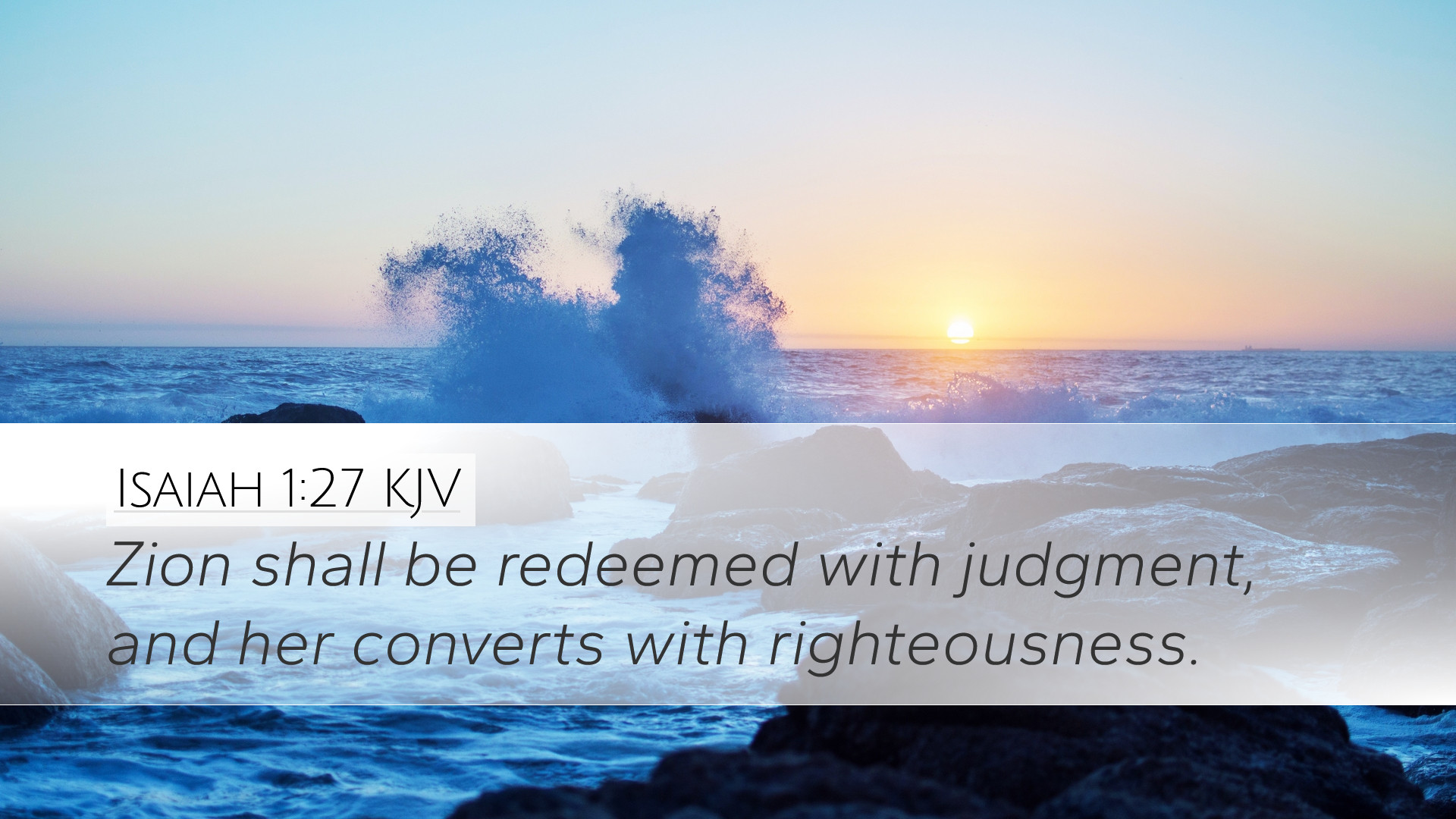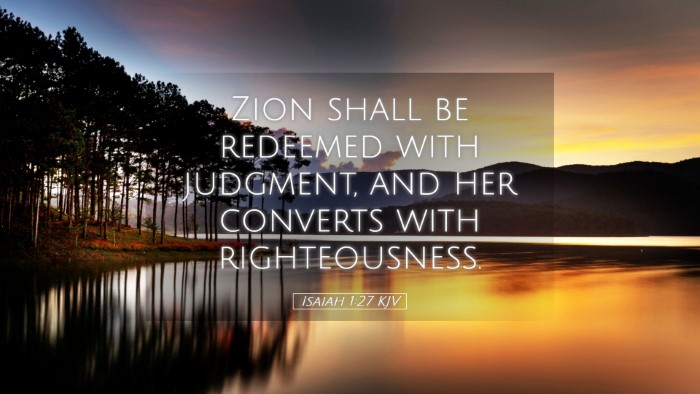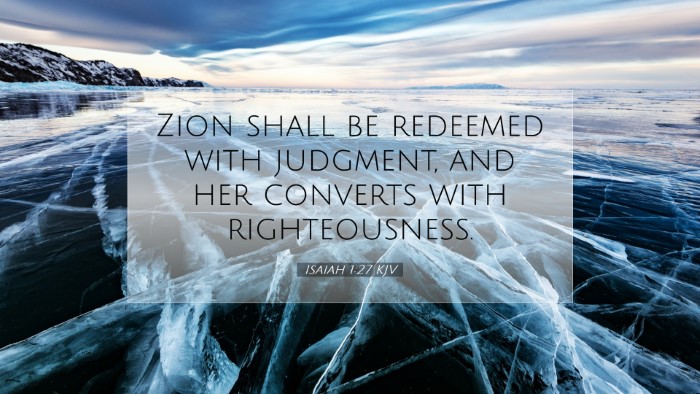Commentary on Isaiah 1:27
Isaiah 1:27 (KJV): "Zion shall be redeemed with judgment, and her converts with righteousness."
Introduction
The verse Isaiah 1:27 encapsulates a profound theological significance regarding the redemption of Zion and the nature of divine justice. It highlights the ultimate restoration and righteousness of God’s people, emphasizing that redemption is intimately connected with judgment and righteousness. In the context of both its historical setting and its spiritual implications, this passage has garnered substantial commentary and interpretation throughout Christian theological discourse.
Theological Insights
Understanding this verse requires an appreciation of the intricate relationship between divine judgment and mercy. According to Matthew Henry, “The redemption of Zion signifies not only a deliverance from temporal evils but also a spiritual restoration.” He underlines that “Zion” represents God's people, who face judgment due to their sins yet have the hope of restoration through divine righteousness.
Albert Barnes further elaborates on this idea: “Judgment and righteousness are often perceived as paradoxical, yet here they are unified in the redemptive process.” Barnes reflects on the notion that true redemption involves a reconciliation with God’s holiness through righteous living, suggesting that this verse underscores the seriousness of sin and the transformative power of divine grace.
Adam Clarke posits that the term “redeemed” in this passage signifies not only liberation but also a purification process. Clarke emphasizes: “Zion’s redemption will not come merely by external deliverance but will involve a judgment that leads to the restoration of right conduct and integrity among the people.” This assertion invites deeper contemplation into the nature of Christian living post-redemption.
Judgment and Redemption
The connection made between judgment and redemption in this verse reflects a biblical theme prominent throughout Isaiah. The prophet often speaks of impending judgment—calling the people to repentance while holding forth the promise of restoration. Henry asserts that “the Lord, as the righteous judge, stands ready to execute judgment, but simultaneously extends a hand of mercy to redeem those who turn back to Him.”
This duality—is encapsulated in the phrase “her converts with righteousness,” pointing to the transformative effect of a genuine return to the covenant. Barnes notes that the converts signify those who embraced God’s call to return, emphasizing that righteousness is the outcome of that transformative experience. It’s a call to holiness and a life reflective of God’s character.
The Nature of Righteousness
The righteousness mentioned in this verse is not merely a human moral standard but a divine attribute that is active in the life of those redeemed by God. Clarke states, “Righteousness here refers to the character of God being formed in His people, resulting in just actions and equitable living.” It serves as a reminder that true righteousness involves both an inner moral compass aligned with God’s will, as well as outward actions that embody this divine quality.
Moreover, Henry highlights that the term carries a communal aspect, whereby the righteous condition of Zion will lead to blessings not just for the individual but for the entire community of faith, creating an environment where justice and love prevail.
Implications for Pastoral Ministry and Theology
The verse provides rich ground for pastoral reflection and teaching. Understanding the link between judgment, redemption, and righteousness can inform preaching, discipleship, and community engagement. Pastors are encouraged to present God as both just and merciful. Barnes remarks, “In ministering the Gospel, one must never shy away from the implications of judgment while holding fast to the hope of redemption.”
Furthermore, Clarke stresses the importance of encouraging believers towards a life of righteousness as a natural response to the grace they have received. The implication here is that the church must be a place that not only celebrates grace but also pursues holiness, embodying the righteousness that is central to God’s redemptive purposes.
Additionally, the community aspect of this verse highlights the importance of collective responsibility. Redemption is not just an individual affair but involves the entire community of faith, echoing the call for holiness and justice in the lives of all members of the body of Christ. This correlation underscores the necessity for communities to engage in social justice initiatives as an outworking of their redeemed status.
Conclusion
Isaiah 1:27 boldly asserts the promise of redemption intertwined with the principles of judgment and righteousness, offering a multi-faceted exploration of God’s interactions with His people. The insights from Matthew Henry, Albert Barnes, and Adam Clarke together emphasize the transformative journey of God’s redemption plan—a call to not merely return to God but to cultivate a life reflective of His righteousness in community.
This passage serves as a sober reminder to both individual believers and the church as a whole, challenging them to look beyond mere deliverance and towards a life characterized by justice, mercy, and holiness, which are hallmarks of God’s kingdom on earth.


